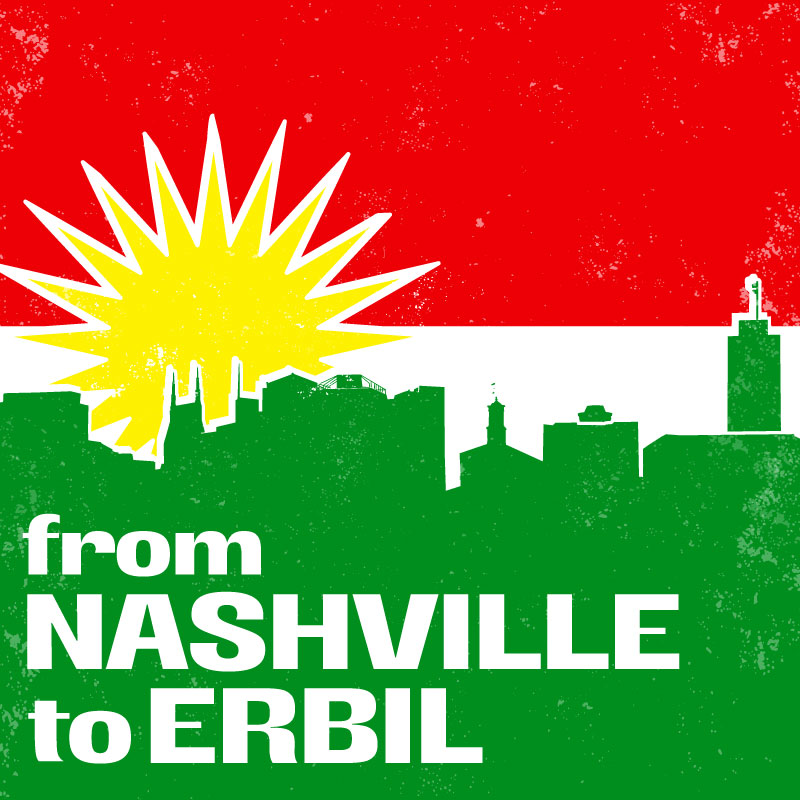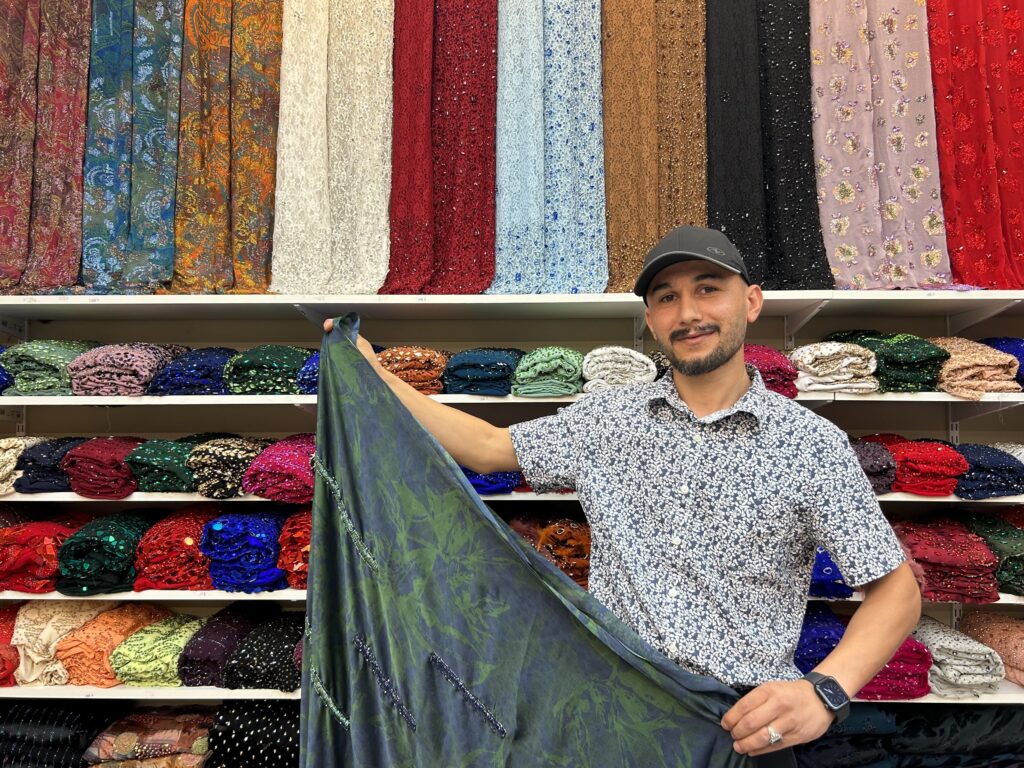
From band T-shirts to cowboy boots to dashikis, clothing is a way to communicate who you are and where you come from to the world around you. That’s true for Nashville’s Kurdish community, which is the largest of any city in the United States. And for a people whose culture has historically come under fire, clothing is a tangible way of preserving their traditions.
The Newroz holiday is undoubtedly one of the most important dates on the Kurdish fashion calendar in Nashville. Families get together each spring to mark the new year by eating, dancing and showing off their best cultural clothing.
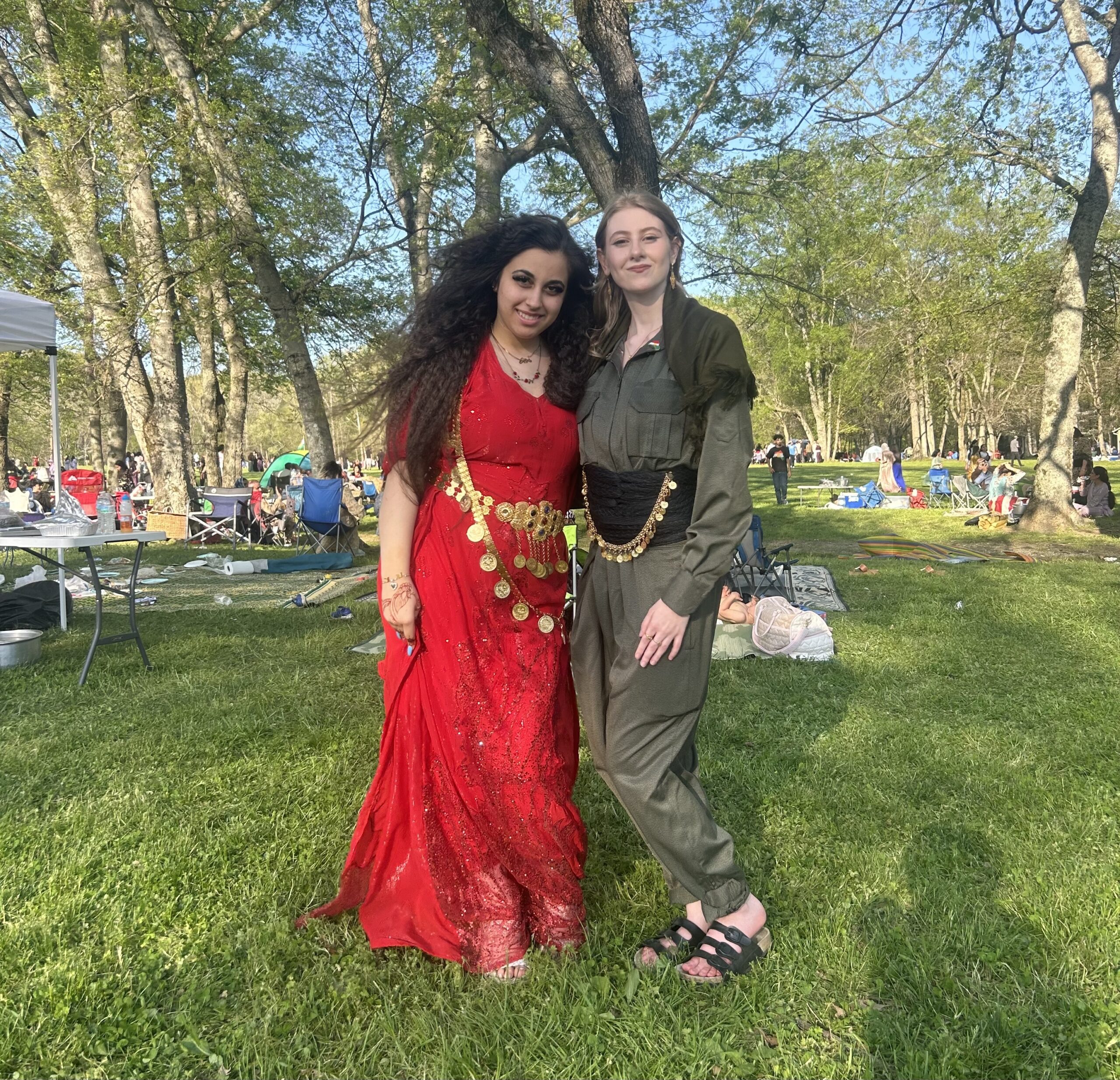 Rose Gilbert WPLN News
Rose Gilbert WPLN News While celebrating Newroz, Zalal Abdullah (left) wears a gown and Rojeen Hasan (right) sports a version of the peshmerga uniform worn by members of the Kurdish military.
Many of the men wear a jacket or shirt with baggy pants that taper at the ankle, and a broad sash tied at the waist.
Meanwhile, many women wear a sparkling kras û kurtak or kras û kawa (as they are known in the Bahdini and Sorani dialects of Kurdish, respectively). This is an outfit made up of a floor-length gown under a long, robe-like jacket with trailing sleeves that flutter in the wind. Vests are also popular. The fabrics are often rich with beading and embroidery, and gold belts and jewelry complete the look.
The details vary region to region, but it’s a distinctive style — if you know what to look for.
“You’re going to know, ‘This is Kurdish,'” said Rahwan Botani, owner of Botani Fabrics.
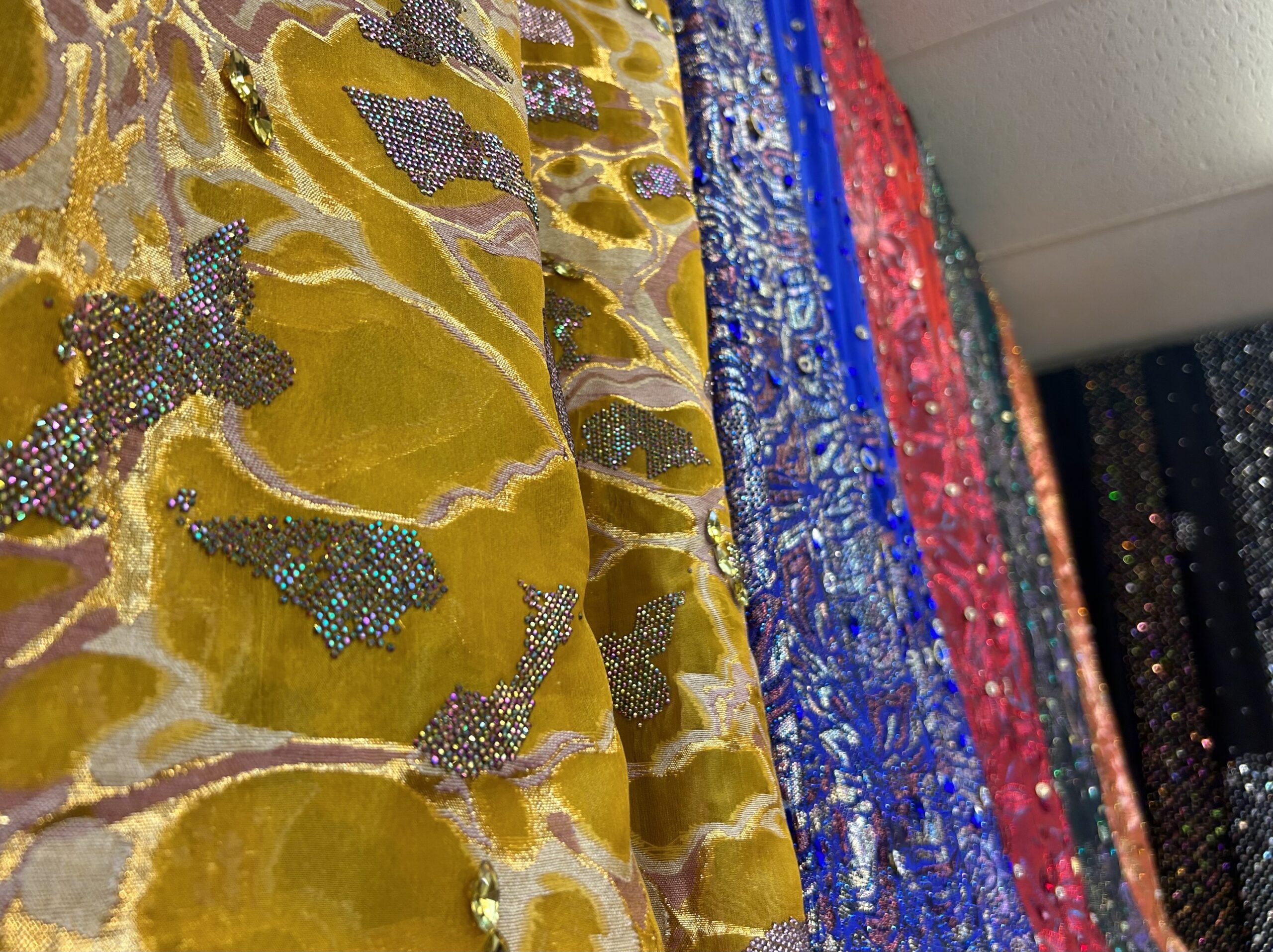 Rose Gilbert WPLN News
Rose Gilbert WPLN News According to Botani, beaded and sequined fabrics are especially popular.
Botani grew up working in his family’s fabric store in Duhok, Kurdistan.
“In Kurdistan, we did the same business. My grandpa, my dad, my brothers and me too,” he said.
But even there, he heard about Nashville. That’s because the store often got customers who had come from the United States to visit their families and wanted to stock up on Kurdish outfits while they had the chance.
Now, they can shop right here in Tennessee.
Botani moved to the United States in 2018, and opened Botani Fabrics in 2022. Tucked into a shopping plaza on Nolensville Pike, the store is brimming with bolts of glittering fabrics, cases of jewelry and racks of clothing imported from Duhok.
“Sometimes, it’s hard for people to bring stuff from back home. So I opened this business here to help the Kurdish community in Nashville and all around the United States,” he said.
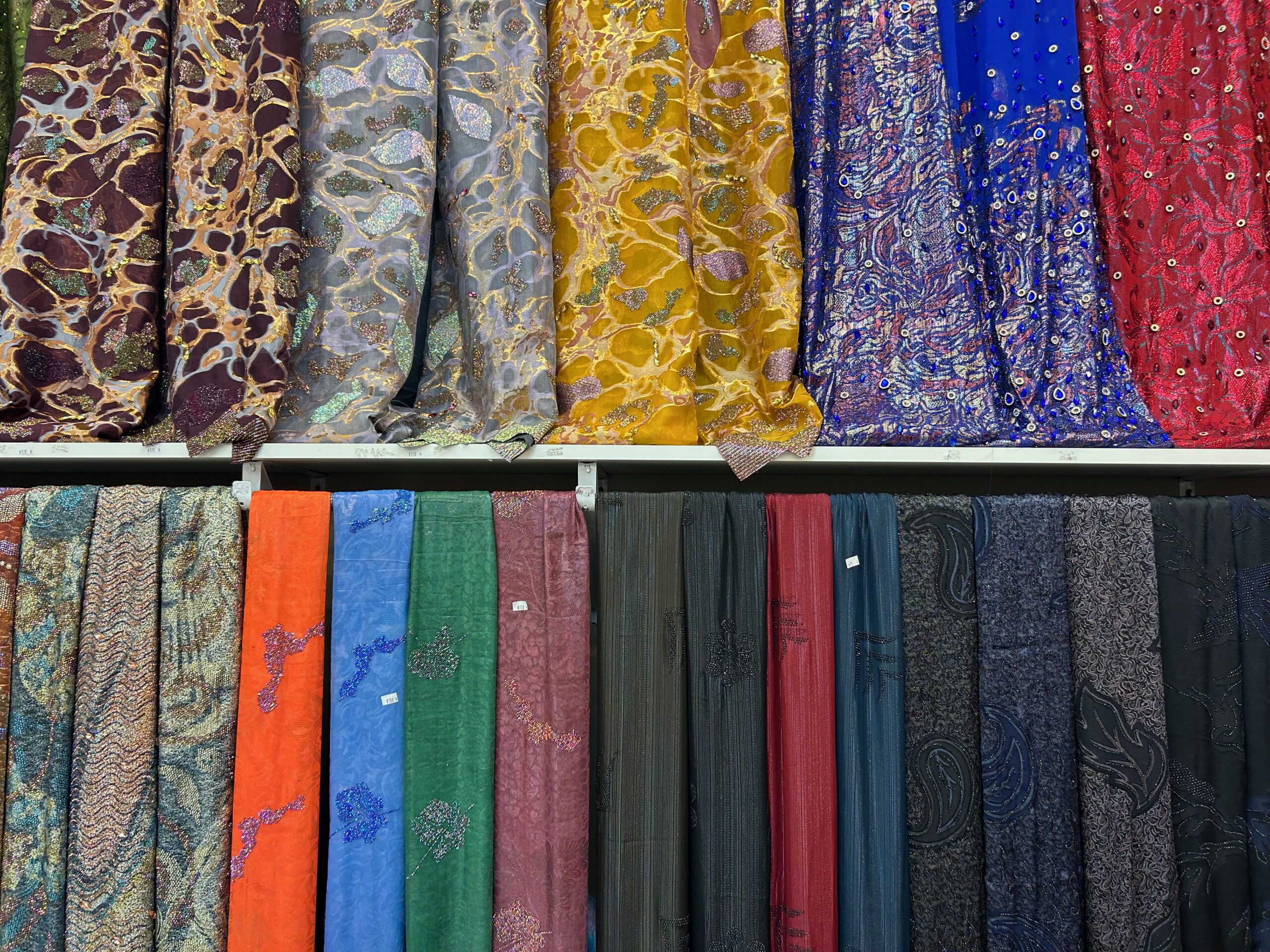 Rose Gilbert WPLN News
Rose Gilbert WPLN News Botani’s store is stocked with bolts of cloth imported from Duhok, Kurdistan.
The demand is certainly there: Botani gets walk-ins traveling from out of state and online orders from as far away as Canada. And, of course, plenty of local customers.
Dilman Yasin is a community outreach coordinator with Kurdish Professionals whose family, like Botani’s, is originally from Duhok, Kurdistan. For her, wearing cultural clothing always feels special.
“I feel like a princess — even the plainest of dresses can make you feel like a princess,” she said.
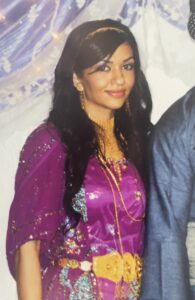 Courtesy of Dilman Yasin
Courtesy of Dilman Yasin Dilman Yasin at her henna party in 2010.
Yasin explains that Kurdish clothes are a must-have for weddings (the bride often wears red for the henna party, although regional differences abound); funerals (darker colors are preferred); and of course, major holidays like Newroz (“Very colorful dresses — the more beads the better!”).
“Our mothers and grandmothers and aunts wore these clothes on a daily basis. And now, because we live in the West, that’s not as common,” she said. “I would never wear a non-Kurdish dress to a Kurdish wedding. It just wouldn’t make sense to me. Having the opportunity to wear that is so important.”
She added that, while American wedding guests generally try to avoid overdressing so as not to upstage the bride, Kurdish wedding guests are more likely to insult the happy couple if they don’t go all out and dress their best.
For a long time, getting ahold of Kurdish outfits in Nashville was a complicated and time-consuming venture.
“In the past, when there were events or weddings, we’d ask our family members from back home to buy the clothing for us and ship it back here,” she said. “That can sometimes be tough because colors and textures aren’t always the same in a picture compared to real life.”
When Yasin visited Kurdistan in 2008, she brought back an entire 50-pound suitcase filled with nothing but clothes and fabric. Now, local options like Botani Fabrics make things easier.
Kurds are one of the largest ethnic groups in the world without a state, and their culture has historically been a target of repression from neighboring governments. That makes passing on cultural clothing — a visible marker of Kurdish identity — even more important.
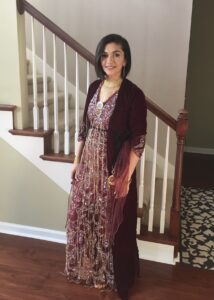 Courtesy of Dilman Yasin
Courtesy of Dilman Yasin Dilman Yasin on her way to her brother’s wedding in 2018.
“Our clothing is very different from our neighbors in the Arab and Turkish and Iranian communities,” she explained. “It’s something that ties us to our roots and to our ancestors, to our grandparents, to our lineage.”
Growing up, Yasin regularly swapped clothes with her sister, cousins and friends. But as she’s gotten older, she’s started holding onto her dresses, including two intricately decorated wedding outfits, to pass down to her 3-year-old daughter, Hivi, one day.
“She sees them in my closet. I don’t hide them. I don’t put them away. They’re always within reach for her to be able to see and feel and touch. And it also helps kind of reflect on her own roots.”
Many of the seamstresses in Nashville who make Kurdish clothing are older, and Yasin worries that the knowledge of the specific silhouettes and patterns could die out locally. So, she’s learning to sew.
She is still a beginner. For now, she practices by making tiny Kurdish outfits for her daughter’s dolls.
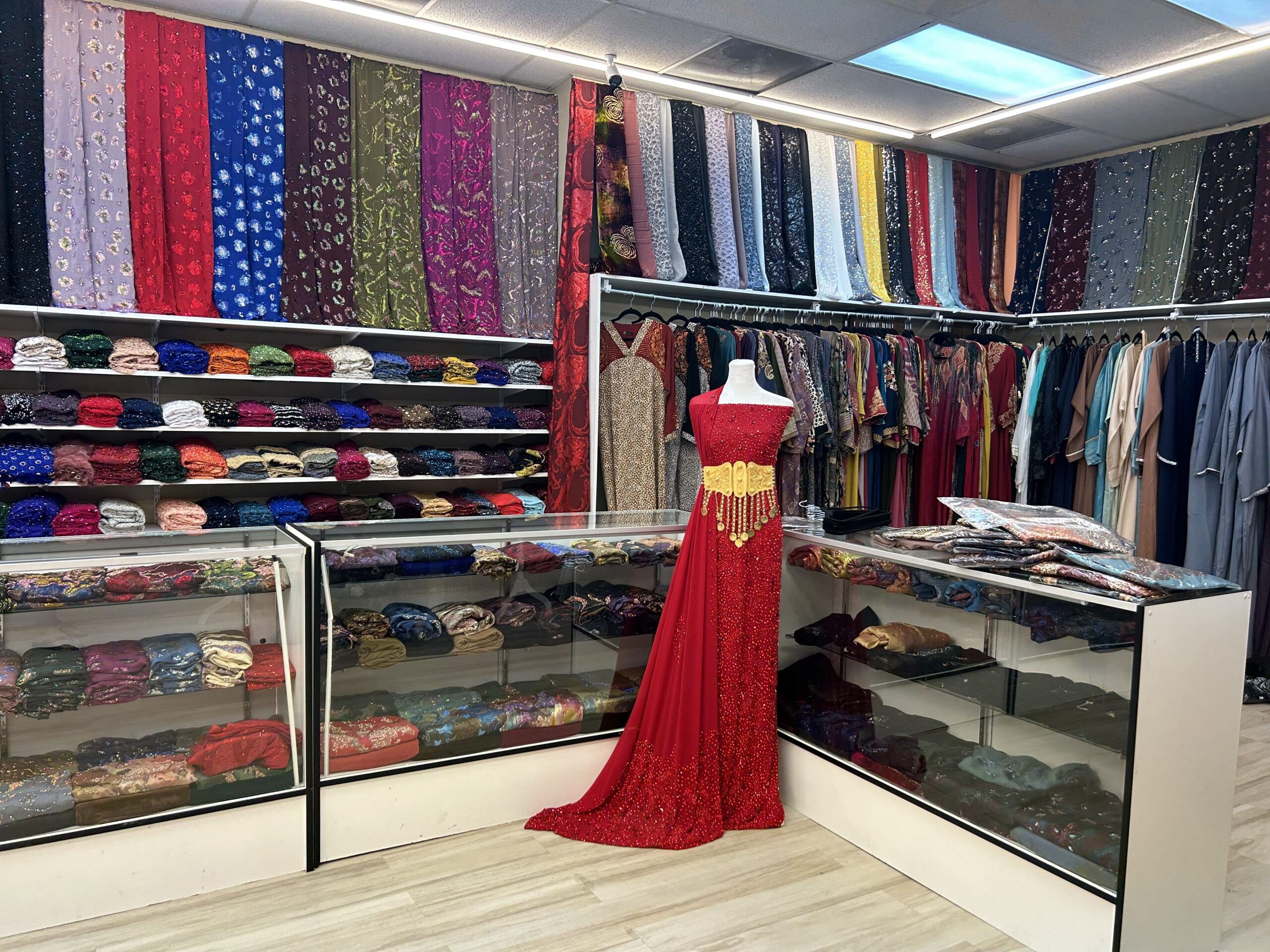 Rose Gilbert WPLN News
Rose Gilbert WPLN News Botani Fabrics, located in South Nashville, has been open since 2022.


